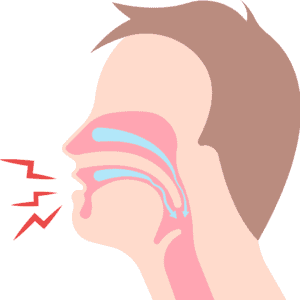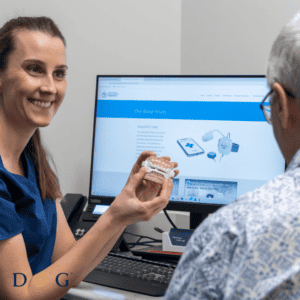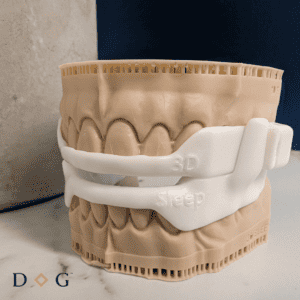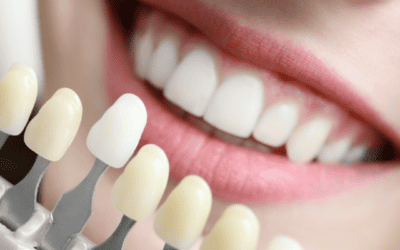Snoring can often be dismissed but it can be an indicator of a more significant health concern such as obstructive sleep apnoea (OSA). From a dental perspective, snoring and OSA not only impact sleep quality but also have broader implications for oral health. In this blog, we’ll explore the dental implications of snoring and obstructive sleep apnoea, and how dental professionals play a crucial role in diagnosis and management.
What is Snoring and Obstructive Sleep Apnoea?
Snoring occurs when the flow of air through the mouth and nose is partially blocked during sleep, causing the tissues in the throat to vibrate. While it may seem benign, persistent snoring can be a sign of a more serious condition called obstructive sleep apnoea (OSA).

Obstructive Sleep Apnoea (OSA) is a sleep disorder characterised by repeated interruptions in breathing during sleep due to the relaxation of throat muscles and tissues, which block the airway. These interruptions can last from a few seconds to minutes and can occur numerous times per hour. The condition leads to fragmented sleep and can result in daytime fatigue, cardiovascular issues, and other health problems.
Dental Implications of Snoring and OSA
Impact on Oral Health:
- Dry Mouth: Mouth breathing, which is common in individuals with snoring and OSA, can lead to dry mouth. This dry environment is less conducive to the natural protective mechanisms of saliva, increasing the risk of tooth decay, gum disease, and bad breath.
- Dental Wear and Tear: The grinding of teeth (bruxism), which can sometimes accompany sleep disorders, may result in enamel wear, cracked teeth, increased sensitivity, and the need for restorative dental treatments.
Identification and Diagnosis:
- Oral Examination: Dentists can often identify signs of OSA during routine exams. Observations may include a large tongue, enlarged tonsils, or a narrow airway. Additionally, dental professionals may notice signs of bruxism or other stress-related conditions that often accompany sleep disorders.
- Sleep Studies: While dentists cannot diagnose OSA definitively, they can refer patients to sleep specialists for sleep studies to confirm the diagnosis. These studies are crucial for determining the severity of OSA and formulating an effective treatment plan.

Treatment Options:
- Oral Appliances: One of the most common dental interventions for OSA is the use of mandibular advancement devices (MADs). These custom-made devices help reposition the lower jaw and tongue to keep the airway open during sleep. MADs can also be an effective alternative for those who cannot tolerate Continuous Positive Airway Pressure (CPAP) therapy.
- Behavioural and Lifestyle Modifications: Dentists can offer guidance on lifestyle changes that may alleviate symptoms, such as weight loss, smoking cessation, and changes in sleep position.
- Collaborative Care: Dental professionals often work in conjunction with sleep specialists, ENT doctors, and other healthcare providers to manage OSA comprehensively. This multidisciplinary approach ensures that all aspects of the patient’s health are considered in the treatment plan.
Why Dental Professionals Matter
Dental professionals are uniquely positioned to identify early signs of sleep disorders due to their frequent observations of oral health issues that can be linked to snoring and OSA. They play a crucial role in:
- Early Detection: By recognizing signs and symptoms related to sleep disorders, dentists can initiate timely referrals to sleep specialists.
- Customised Solutions: Dentists can provide personalised treatment plans and oral appliances tailored to the individual needs of patients with sleep disorders.
- Patient Education: Educating patients about the potential connections between their oral health and sleep patterns empowers them to seek appropriate care and make informed decisions.

Conclusion
Snoring and obstructive sleep apnoea are not merely sleep disturbances; they are conditions that can have significant repercussions for overall health and well-being. From a dental perspective, recognising the signs, understanding the implications for oral health, and providing appropriate interventions can make a meaningful difference in the management of these conditions. By addressing these issues proactively, dental professionals can help patients achieve better sleep and improve their quality of life.
If you suspect you have a sleep disorder or are experiencing symptoms like snoring, consult your dentist. They can help identify potential issues, guide you through treatment options, and collaborate with other healthcare professionals to ensure comprehensive care.
Your oral health is closely linked to your overall health, and addressing sleep-related issues is a crucial step towards a healthier, more restful life.
References
- American Academy of Sleep Medicine (AASM)
- AASM provides comprehensive information on sleep disorders, including obstructive sleep apnea. Visit their website for resources and guidelines.
- Website: aasm.org
- American Dental Association (ADA)
- The ADA offers insights into the role of dental professionals in diagnosing and managing sleep disorders.
- Website: ada.org
- National Heart, Lung, and Blood Institute (NHLBI)
- NHLBI provides detailed information on obstructive sleep apnoea, its symptoms, and treatments.
- Website: nhlbi.nih.gov
- Sleep Foundation
- The Sleep Foundation offers articles on snoring, sleep apnoea, and the role of dental devices in managing these conditions.
- Website: sleepfoundation.org
- International Journal of Dental Sleep Medicine
- This journal focuses on the intersection of dental health and sleep medicine, including articles on the use of oral appliances for sleep apnoea.
- Website: ijdsm.org
- American Academy of Dental Sleep Medicine (AADSM)
- AADSM provides resources for dental professionals regarding the management of obstructive sleep apnoea and other sleep-related disorders.
- Website: aadsm.org



